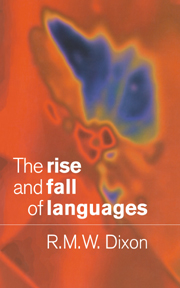Book contents
- Frontmatter
- Contents
- Acknowledgements
- 1 Introduction
- 2 Preliminaries
- 3 Linguistic areas and diffusion
- 4 The family tree model
- 5 Modes of change
- 6 The punctuated equilibrium model
- 7 More on proto-languages
- 8 Recent history
- 9 Today's priorities
- 10 Summary and prospects
- Appendix – where the comparative method discovery procedure fails
- References
- Index
6 - The punctuated equilibrium model
Published online by Cambridge University Press: 05 June 2012
- Frontmatter
- Contents
- Acknowledgements
- 1 Introduction
- 2 Preliminaries
- 3 Linguistic areas and diffusion
- 4 The family tree model
- 5 Modes of change
- 6 The punctuated equilibrium model
- 7 More on proto-languages
- 8 Recent history
- 9 Today's priorities
- 10 Summary and prospects
- Appendix – where the comparative method discovery procedure fails
- References
- Index
Summary
The hypothesis put forward here to describe and explain the development of language during the 100,000 or more years since its first emergence is that there have been long periods of equilibrium during which a number of languages have coexisted – in a more or less harmonious way – within a given region without any major changes taking place. From time to time the state of equilibrium is punctuated by some cataclysmic event; this will engender sweeping changes in the linguistic situation and may trigger a multiple ‘split and expansion’ (which would be appropriately modelled by a family tree diagram). The punctuation may be due to some natural event (floods, drought, volcanic eruption), or to the emergence of an aggressive political or religious group, or to some striking technical innovation, or simply to entry into new and pristine territory. After the events which caused the punctuation have run their course, a new state of equilibrium will come into being.
I suggest that, over the history of human language, periods of punctuation have been relatively short in duration, by comparison with periods of equilibrium. The last major punctuation began in the fifteenth century, with European colonisation of almost all the rest of the world, and is still in mid-stream; this has led, or is leading, to the extinction of the great majority of languages.
European scientists have only ever been able to observe a time of punctuation since, wherever Europeans go (with their weapons and religions and writing), they effect a punctuation in the existing state of equilibrium.
- Type
- Chapter
- Information
- The Rise and Fall of Languages , pp. 67 - 96Publisher: Cambridge University PressPrint publication year: 1997



